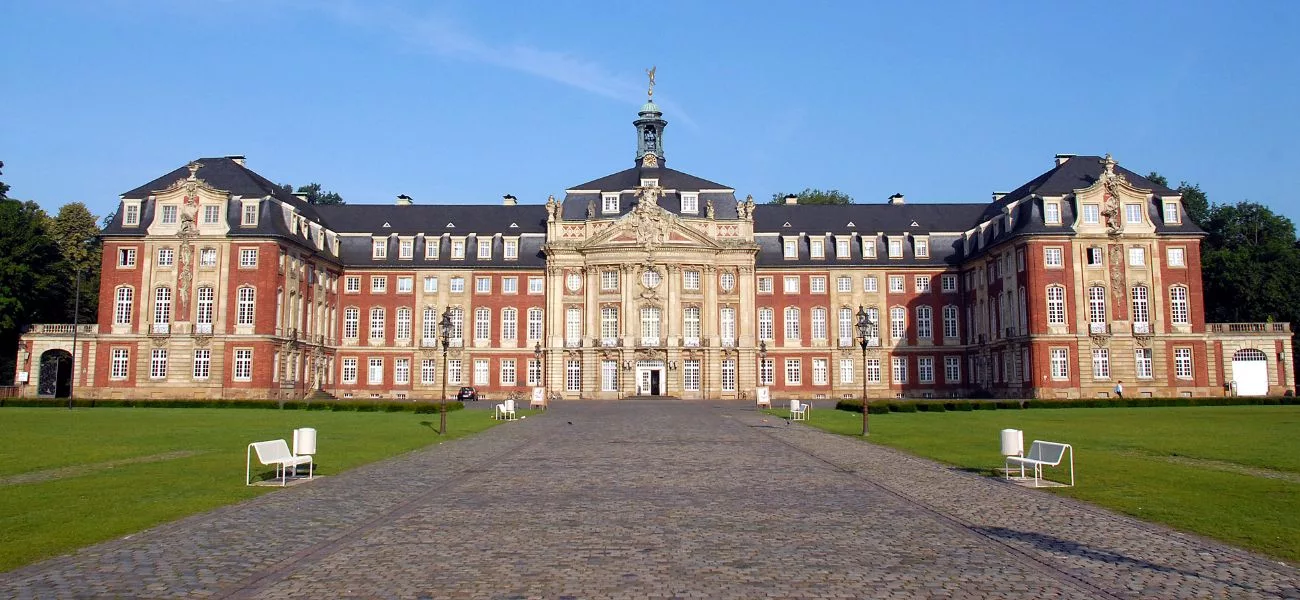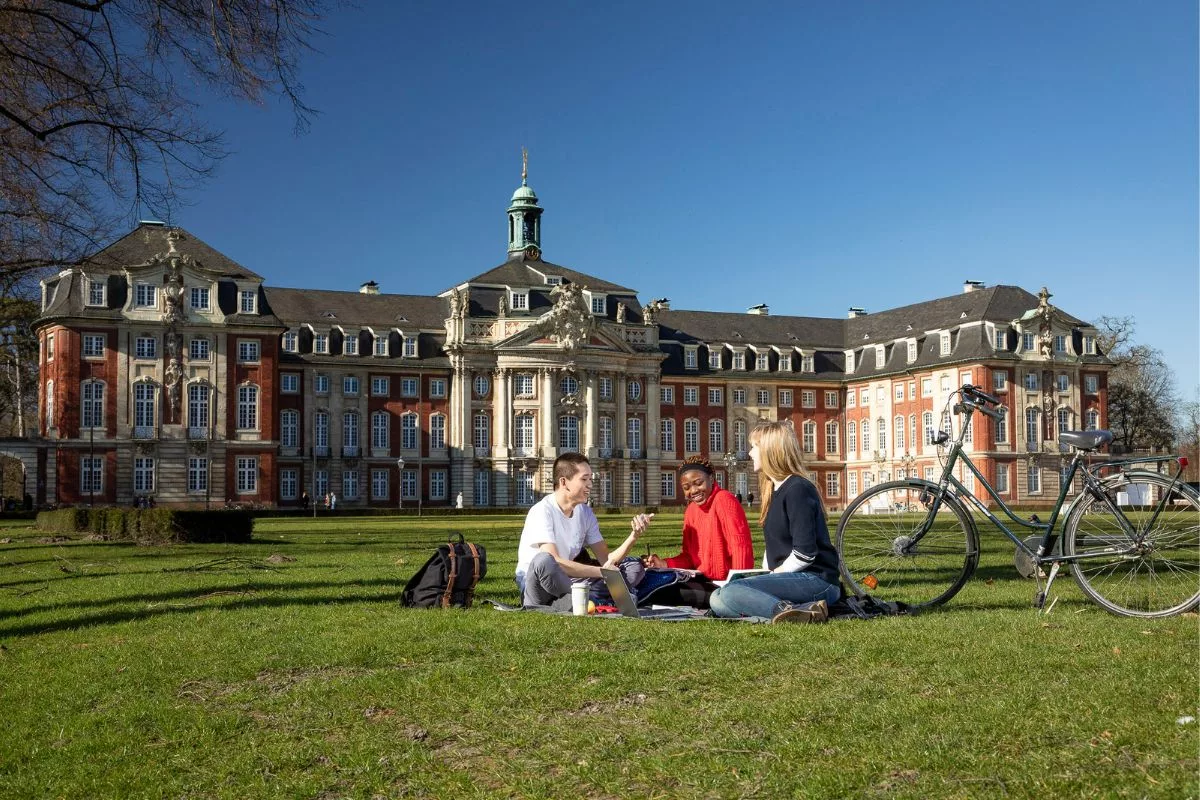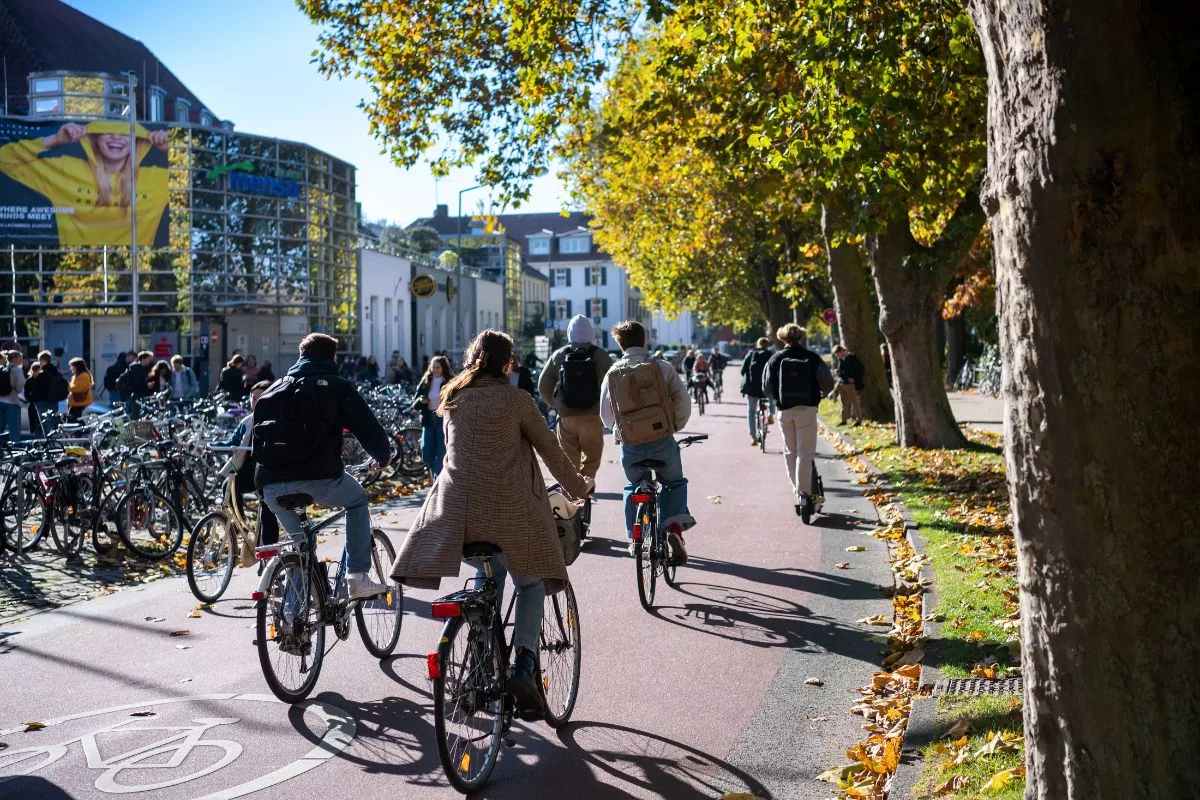Welcome guide

Long academic tradition and an outstanding reputation in research and teaching
With more than 45,700 students, the University of Münster is one of the largest universities in Germany. Thanks to its extensive range of degree programmes, multifaceted research profile, and the atmosphere and quality of life in Münster, the University attracts students and researchers from Germany and around the world.
Study programme
The University of Münster offers an extensive range of academic options with over 120 subjects and about 280 degree programmes. Münster University values the close relationship between research and teaching, counselling services and high student graduation rates.
Münster without students? Unthinkable!
It’s hard to imagine life in Münster without the University. A fifth of the 320,000 « Münsteraner » are students. The flair and feeling of student life is everywhere you look – on the streets and in Münster’s diverse cultural programme. Münster, hailed as the ‘Bicycle Capital of Germany,’ underscores its commitment to sustainable transportation with numerous biking facilities.

Useful information to study in Münster
Budget to plan
Even though international students are not required to pay tuition fees in Germany (with only a few exceptions), studying does cost money.
Students in Münster normally need between € 850 and € 900 each month to cover living expenses in Münster without having to work part-time. These include:
- Rental fee for a room: ca. € 300 – € 450
- Health insurance: ca. € 110
- Food and recreation: ca. € 250 – € 300
- Study materials: ca. € 50 – € 100
Futhermore every student hast o pay a semester fee of around 350 euros each semester. Please keep in mind that your expenses will be higher at the beginning of the semester. In addition to the semester fee and if applicable, your residence permit, you should set aside extra money for a possible deposit on your room/apartment, household goods, books for your courses etc.
Id document required
- Incoming EU citizens only need their ID card or passport.
- Non-EU citizens will need their passport and the correct visa.
Visa application
Depending on where you come from, you may need a visa to enter Germany. International students require a « visa for study purposes », commonly called a « student visa ». You cannot study in Germany on a tourist visa. German embassies can provide more information on matters relating to visas.
Insurance
Nobody likes to expect the worst. But things can happen.
Health insurance
In order to enrol at the University of Münster, you must present proof that you have adequate health insurance coverage. Students from EU and EEA member states must bring their European Health Insurance Card (EHIC) with them when they enrol to ensure that their health insurance is recognised in Germany.
Liability insurance
All it takes is a moment’s carelessness and suddenly the book or camera you borrowed is damaged. If you have no liability insurance, you have to pay for the damage yourself – and that can be expensive. It’s best to protect yourself by taking out liability insurance which covers all damage done to other people or their property through carelessness. Each insurance company will give you a different quotation, so it’s worth comparing.
Banks
You will need your own bank account to pay for your regular expenses, e.g. rent, health insurance and semester fees. Students from EU and EEC member states should inquire before arriving to what extent they can use their existing bank accounts in their home countries for transactions in Germany.
If you rent a room in a dorm of the Student Association (Studierendenwerk) a German Bank account is mandatory.
Accommodation
Ideally, you should start looking for an accommodation and other housing options as soon as you receive your notification of admission. There are several types of student housing. For example, you can rent a room in a residence hall, sublet a room in a shared flat (WG) or rent your own room from a private landlord.
Ride to campus
Airplane
The Münster/Osnabrück airport is only 30 km away from the centre of Münster. A shuttle bus connects the airport with the city’s main railway station. The Münster/Osnabrück airport can be reached from numerous international airports.
Train and bus
If you arrive by train you’ll find bus-stops right in front of the main railway station. From there buses will take you to all parts of the city. Bus timetables can be obtained from the Stadtwerke Münster (Münster Public Services).
Academic registration at the University of Münster
You must officially enrol at the University of Münster before you can commence your studies. Please read the information concerning enrolment procedures carefully – especially regarding the enrolment deadlines – provided in your notification of admission. Please note that enrolment deadlines cannot be extended. However, online enrolment can be completed from home.
Every student receives a student ID card.
Transport plan
Whether you travel by plane, train or automobile, Münster is well connected to Germany’s transportation system. The nearest airport is the Flughafen Münster/ Osnabrück (FMO), which is about 45 minutes away by bus from the main train station in Münster. The airports in Dortmund, Düsseldorf and Amsterdam are also nearby. We recommend checking online air travel portals to compare prices and determine whether the airlines in your home city make stops at one of these airports. If you have any questions about what to do when you arrive, please contact the InfoPoint team at the International Office.
Semester ticket
Students at the University of Münster receive a semester ticket which entitles them to use all modes of public transportation in and around the city of Münster at no charge.
Mobile plan
Telecommunication is affordable in Germany and can be easily activated. Various companies offer fast prepaid services.
Health insurance
In order to enrol at the University of Münster, you must present proof that you have adequate health insurance coverage. Students from EU and EEA member states must bring their European Health Insurance Card (EHIC) with them when they enrol to ensure that their health insurance is recognised in Germany.
Residency permits
Everyone who lives in Germany is required to register their place of residence with the Citizens Office (Bürgerbüro) in their respective district. You must register within two weeks after moving to your new address.
Introduction
The University of Münster is one of the largest universities in Germany with a rich and time-honoured tradition. It enjoys an outstanding reputation in the region and far beyond. Fifteen faculties with more than 120 subjects and some 30 research centres comprise the institutional backbone of the University. Students and academics appreciate the University’s excellent research opportunities, high-quality teaching, promotion of junior researchers, and the advantages of living in the city of Münster. Our slogan sums it up best: « living.knowledge ».
Academic calendar
The academic year in Germany is divided into two semesters. The winter semester officially begins on 1 October and the summer semester officially starts on 1 April.
All details about the academic calendar are available here.
Language courses for international students
Different language courses are offered each semester.
More info
Libraries
The University of Münster provides libraries and study areas with a wide selection of books, journals, magazines and newspapers at multiple locations in Münster as well as online resources.
Canteens
Affordable cafeterias are available all over Münster and students get a special discount. There is also one canteen that offers vegetarian meals only.
Activities at university
At the University of Münster there are numerous sports courses, clubs and groups that students and staff can get involved in, not to mention various international student groups and religious communities.
International relations contacts
The International Office supports degree students in Münster going abroad as well as international incoming students. We also support staff and Reserchers in international mobility. You can find all contact details here.
Alumni
The University of Münster is strongly committed to cultivating close and lasting ties with its former students and staff. To this end, the University founded the Alumni Club in 2001. Since then its membership has grown to more than 26,000 registered alumni. Stay in close contact with your alma mater and your former fellow students! The Alumni Club helps you maintain these important contacts through numerous events, services and a wide range of information.
Extra scholar activities
Münster University arranges a variety of activities for students and has an active Erasmus Student Network.
With around 300,000 inhabitants and some 55,000 students, Münster is a bustling academic and cultural city with numerous museums, theatres and events. Münster is well-known as Germany’s bicycle capital – statistically speaking, there are two bicycles to every inhabitant! The historic city centre, Lake Aa and the moated castles in the region have made Münster very popular among residents and students alike.
Student jobs
There are a few things to consider when financing your studies with a part-time job: the workload in your degree programme does not leave much time for a part-time job. Student jobs are in high demand and sufficient language skills are often required. Please keep in mind that student jobs can affect health, pension and social insurance contributions as well as your tax obligation!
Job offers are regularly published in the regional daily papers (Westfälische Nachrichten, Münstersche Zeitung) and the local event gazettes (e.g. Na Dann, Ultimo, GIG).
There are also student assistant positions (studentische Hilfskraft/SHK) in the faculties, institutes and various facilities of the University. On the Career Portal of Münster University job offers such as work placements, student traineeships and graduate positions can be found.
You can find tips for applying for a part-time job on the Career Service info portal.
Tips
- Buy a bicycle as soon as possible (you can easily sell it at the end). Münster is a green city with numerous parks and boulevards. A five-kilometre parkway encircles the historical city limits of Münster, along which you can easily reach any destination in town by bike.
- Make sure to carry at least some cash (€) with you as in some places credit cards will not be accepted.
- Pay attention to the opening hours of the shops (most of them are closed on Sundays)
- Get familiar with German, at least know basic phrases.
- Give your semester ticket an upgrade! For only 14,70 euros per month you can explore the whole of Germany by train.
- If you ever get lost, don’t be afraid to ask for help. Everyone will be happy to help you.
To do list
• With its Prinzipalmarkt, St. Lambert’s Church and historic city hall, Münster’s city centre is a great place to take a stroll or go window shopping. There are also many bars and restaurants.
• The Aasee (Lake Aa) is situated near downtown and is a popular place to take walks, jog or go sailing.
• Another popular spot is Münster’s harbour quarter with its many bars and recreational opportunities.
• Theatre performances, variety shows, live concerts, a stroll though a museum, a visit to the cinema, readings – as far as culture goes, Münster has something for everyone.
Students associations
Students and staff at the University of Münster can participate in a wide variety of university groups and associations. Check them here.
Emergency
Fire Service and Ambulance: 112
Police: 110
Doctors Emergency Service: 0251 / 116 117
Taxi: 0251 / 60011
Find Emergency Numbers:
https://www .muenster.de/notdienste. html
Find a doctor in your neighbourhood: http://www.kvwl.de/earzt/index.htm
City maps
Click here to access the map of the city.
Annual event’s calendar
Please find here the calendar of events:
https://web.muenster.de/veranstaltungskalender.html
Green Mobility in Münster
Would you like to move around Münster in the most sustainable way? This guide provides practical examples of how to reduce greenhouse gas emissions and pollution from the transport sector.
Check out our list of tips on public transportation in Münster, cycling in the city & other means of transportation, how to live sustainably in the region and the support offered by the University of Münster in this regard.
